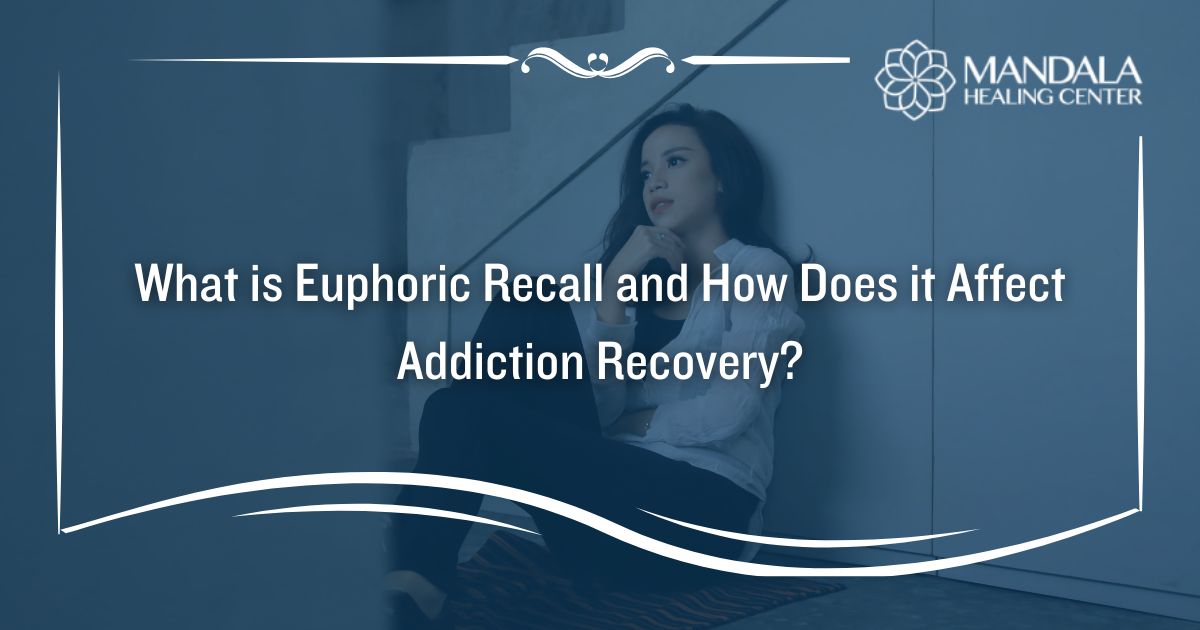Addiction is a chronic and progressive disease that affects millions of Americans each year. According to the Substance Abuse and Mental Health Services Administration (SAMHSA), 48.7 million people struggled with a substance use disorder in 2022.[1]
When you are recovering from drug or alcohol addiction, there are many challenges to overcome. First, you have to get through withdrawal and detox. Then, you are asked to unpack the root causes of your addiction.
You might think your work is done once you complete an addiction treatment center. Unfortunately, there are still barriers to overcome. One of those barriers is something referred to as euphoric recall.
Euphoric recall in addiction recovery is a state in which you remember your addiction through a positive lens. Instead of remembering the negative aspects of your substance abuse, you are reminiscing about the good times. Experiencing euphoric recall can increase your likelihood of relapsing, making it important that you do the work to overcome it.
In this article, you will learn:
- What euphoric recall means
- The difference between euphoric recall and cravings
- How to tell if you are dealing with euphoric recall
- How to avoid a relapse
What is Euphoric Recall in Recovery?
Euphoric recall is when individuals remember the past in “rose-colored glasses.” It can be related to any situation, from past relationships that were harmful to substance abuse and even behavioral addictions. About addiction recovery, this state of mind causes you to only remember the positive aspects of your substance abuse.
For example, if you experience euphoric recall in addiction recovery, you might only remember how drugs and alcohol took away your painful emotions. You could also think of times when you were partying with friends and having fun instead of the challenges that substance abuse brought into your life.
According to a study based on recovery from stimulant addiction, “Euphoric recall is a potent risk factor for recurrent substance use because it minimizes patients’ perceptions of stimulants’ danger, promoting an ambivalence about quitting.”[2]
This phenomenon can lead to relapse. When you only think of positive memories from your substance abuse, you are more likely to return to the behavior.
Are Cravings the Same Thing as Euphoric Recall?
Cravings are a common issue for people in early recovery. They are characterized by suddenly feeling strong urges or desires to use drugs or alcohol. Cravings are often triggered by people, places, or things that remind you of your substance abuse.
While cravings are a serious risk for drug addiction, they are not quite the same as euphoric recall. However, if you experience euphoric recall, you could begin dealing with cravings. This is why it is so important to recognize the signs and use recovery tools to recenter yourself and avoid returning to substance abuse.
Signs of Euphoric Recall
The main signs of euphoric recall are exaggerating the positive and minimizing the negative. You might experience intense emotions when recalling a positive memory about drugs or alcohol. It is also common to obsessively think about the good times you had when you were abusing substances.
Euphoric recall can be more than simply thinking about drugs in a positive light. You can also experience physical and psychological side effects, including:
- Increased heart rate
- Trouble concentrating
- Irritability and anxiety
- Suddenly viewing recovery in a pessimistic light
- Reaching out to friends who engage in substance abuse
- Depression and hopelessness
- Feelings of loneliness and isolation
- Mood swings
- Blocking out negative memories associated with drug and alcohol use
While it is okay to remember some of the positives during your time dealing with addiction, you need to recall the negative aspects as well. Failing to remember the harm your substance abuse caused will make you more likely to begin abusing drugs and alcohol once more. Thankfully, there are ways to ensure you avoid a relapse and overcome euphoric recall.
How to Avoid a Relapse
When you are experiencing the effects of euphoric recall, it’s important to use healthy coping mechanisms to stay on track in the recovery process. Thankfully, there are plenty of ways to prevent your recall from turning into a relapse.
The best tips for avoiding relapse when dealing with euphoric recall include:
- “Playing the tape through” or remembering the harms your substance abuse has caused
- Reaching out to friends and family members for support
- Attending addiction support groups and talking to other people in recovery
- Keeping up with regular therapy sessions
- Engaging in self-care routines
- Sticking to a daily schedule that prevents boredom and keeps you accountable
- Keeping a gratitude journal to remind you of the positives of recovery
If you begin experiencing cravings for drugs and alcohol, reach out to sober support like a sponsor or a close friend from your recovery community. Let them know how you are feeling and ask for advice. Additionally, you should speak to a therapist for tips on healthy coping mechanisms to use when feeling down, stressed, or anxious.
Find Help for Drug and Alcohol Abuse
Each stage of recovery comes with new challenges and barriers to overcome. If you are dealing with addiction, the best way to build a solid foundation of recovery is to attend a drug and alcohol rehab program. At the Mandala Healing Center, we offer evidence-based treatments to ensure you get the help you need.
Contact us today to learn more about our drug and alcohol addiction treatment program.
References:
- The Substance Abuse and Mental Health Services Administration (SAMHSA): HHS, SAMHSA Release 2022 National Survey on Drug Use and Health Data
- The National Library of Medicine (NLM): Chapter 5—Practical Application of Treatment Strategies












